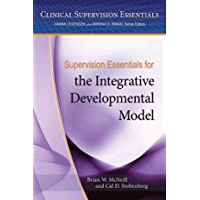“Supervision Essentials for the Integrative Developmental Model”

“Supervision Essentials for the Integrative Developmental Model.”
By Brian W. McNeill and Cal D. Stoltenberg.
American Psychological Association
Washington, D.C., 2016
Volume is useful resource for supervisors
Reviewed by Kerry Morrison, Psy.D.
Most professionals would agree that the overall goals of clinical supervision in psychotherapy are to monitor the quality of services while enhancing professional competence as well as acting as a gatekeeper for the profession.
The process of supervision involves a collaborative relationship with facilitative and evaluative components. Most supervisors are senior clinicians. One thinks of the concept of master and apprentice, but rarely are supervisors taught, either in educational or professional settings, how to supervise.
If supervision is generally not taught at school or on the job, then how does a supervisor learn and become proficient? Is it through having experienced good supervision as a supervisee? Is it through trial and error or by the seat of their pants?
This recent publication can serve as a useful resource for beginning and experienced supervisors.
Authors McNeill and Stoltenberg are master clinicians who explicitly trained to be supervisors and are currently working as supervisors. The book helps in the understanding of supervisee growth and development. Its empirically tested approach can help supervisors monitor trainee progress on several levels and across differing theoretical orientations.
The volume outlines the stages of supervisee development and provides suggestions for mentoring professional growth and increasing competence.
In the Integrative Developmental Model outlined, the goals of supervision are achieved by increasing trainee or supervisee awareness, motivation and autonomy through a process that integrates cognition, affect with interpersonal, developmental and social influences.
McNeill and Stoltenberg focus on the qualities of a master therapist and therefore a competent supervisor. There is a helpful discussion of the three core concepts in the supervisory structure; supervisee motivation, autonomy and awareness of both cognitive and affective realms of self and other in psychotherapy.
The authors’ measure supervisee growth in eight domains: intervention skill competence; assessment techniques; interpersonal assessment; client conceptualizations and diagnosis; attention to individual difference in work with clients; theoretical orientation; treatment plans and goals and professional ethics.
They encourage supervisees to engage in “reflection in action” (in the therapy sessions) and “reflection on practice” (in the supervisory sessions), which are very useful concepts and practices.
The Integrative Developmental Model incorporates recent research and has been empirically tested. The book provides sample supervision sessions taken from the authors’ real supervisory practices. Excellent charts and forms are provided throughout the text and appendices.
Kerry Morrison, Psy.D., is a psychologist for the Department of Developmental Services in the Central/West Region of Mass., who also has a private practice, consults, teaches and provides training on a range of mental health topics.
Learn more about the book: Supervision Essentials for the Integrative Developmental Model (Clinical Supervision Essentials)
